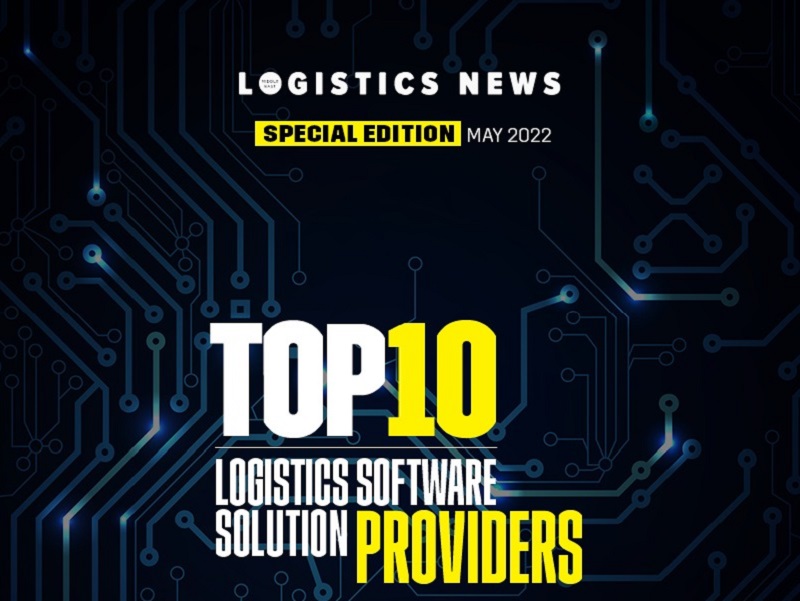In this special feature, we shine the torch on software solution providers in the logistics industry who are raising the bar with innovative, advanced, and optimised solutions to improve accuracy, minimise costs and increase transparency
 1. Lyve
1. Lyve
Wadih Mattar, Head of eCommerce
The past two years have been challenging yet fulfilling for Lyve, the UAE-based logistics solutions and technology provider. The company offers a diverse portfolio of logistics, eCommerce, and business solutions.
From big data to multi-vertical service agents, and instant activation to scalable capacity, Lyve goes beyond what’s typically considered delivery. The company was founded with a vision to reimagine logistics as an enabler of digital transformation and business innovation.
The company rebranded itself from being purely a last-mile delivery platform to offer a plethora of other logistics solutions in August 2020. The rebranding mirrored its ushering into a new era of digital growth and development.
Lyve invested its resources and manpower in technology, believing that the success of last-mile logistics lies at the core of digitisation. Through the continuous improvement of its software and the diversification of its products, Lyve branched out into new verticals such as courier, pharmaceuticals, telecom, and eCommerce – acquiring prominent clients while also penetrating new markets such as Kuwait, Saudi Arabia, Egypt, and India.
Since then, the company has seen an exponential growth both in revenue and in workforce.
Wadih Mattar says: “Technology has helped increase real-time visibility in logistics and in the supply chain. It has increased agility, giving businesses the ability to take the right action at the right time.
“In the future, we will achieve complete automation in fulfilment centres and autonomous vehicles in logistics. Through big data analytics, business will have the ability to pinpoint operational inefficiencies and will be able to resolve them. Machine learning and AI will further streamline the processes.”
Adding further, he noted: “Through our technology products, we improve visibility, agility and give businesses full control over their fleet and operations in general. Through data, businesses can get valuable insight into their operations and can optimise to increase efficiency and cut costs.
“Our vision is our key differentiator. We are building an ecosystem beyond logistics and fulfilment. We are harnessing technology to have presence in and enhance digital transactions beyond the logistics and supply chain industry.”
 2. RouteQ
2. RouteQ
Vladimir Nesterov, General Manager – Middle East
“Having an online purchase delivered in the real world is an experience that touches just about every single person on the internet, more than 4.5 billion people, says Vladimir Nesterov.
“Businesses that not only sell a great product online, but then get it to its destination, will reap enormous rewards in the near term and are likely to keep doing so for the long term.”
RouteQ is a plug-and-play AI-powered software solution that makes it possible to effortlessly level-up delivery operations. It lets users sustainably manage their fleets while increasing customer satisfaction and making more money at the same time.
RouteQ’s value lies in traffic data, which is harnessed to precisely estimate delivery arrivals while making 99% of deliveries on time (and delivering 30% more orders with the same-sized fleet).
The software offers a level of transparency into the delivery process that hasn’t been seen before — everyone from customer service to the delivery person to the customers themselves has a clear window into the entire delivery process and can easily communicate with each other there.
Nesterov adds: “When it comes to the last mile, the best-in-class technology can make a huge difference. In the low margin eGrocery business for example, last mile operations can account for as much as 25% of a product’s total cost. Automated delivery routing and investment in supply chain transparency can significantly reduce fleet mileage, improve resource management, increase customer loyalty, and directly affect P&L.”
For this reason, RouteQ offers two major services: automatic route planning and improved courier monitoring and communication.
Automatic route planning system rapidly finds the best routes for companies with lots of orders across a variety of logistics scenarios. Nesterov adds: “It uses historical traffic data and precise arrival time predictions to optimise these routes. It can formulate routes while accounting for various conditions like freight dimensions, transport capacity, acceptable delivery time margins, the throughput of warehouses, and beyond.”
While a courier monitoring system facilitates enhanced communication between drivers, logistics officers, and customers. It consists of three components: an app for employees on the road, a logistics workstation, and a client widget. “This service brings more transparency to the delivery process, letting cargo movement be viewed in real time for more readily eliminating discrepancies,” he states.
Sharing his views on the future of technology in logistics, he says: “We are approaching a time when companies will have to prioritise supply resilience over just-in-time delivery, and some might even reconceive their entire logistics strategy around this. Flexibility and adaptability are the major trends for future logistics.”
He concludes: “For many delivery-dependent businesses, changing out their software tools will be the first step toward capturing such adaptability. Software that intelligently manages a delivery fleet, whatever size that fleet may be, offers the ability to balance between logistics efficiency and the level of customer service being offered.”
———————————————————————————————————————————————————-
 3. Kale Logistics Solutions
3. Kale Logistics Solutions
Nagarjun Peri, General Manager – Middle East
Digital transformation is now the centre of the logistics industry. “We are at a stage in the industry evolution, where without the right digital impetus, we may not endure the haul. The future belongs to technology. New age technologies like blockchain, AI/ML, IoT, mobile apps, robotics, and big data will shape logistics and cargo movement in the future,” says Nagarjun Peri.
As far as technology adoption in the logistics industry is concerned, there is going to be a significant jump, believes Peri. “This is because every other stakeholder is now realising what technology can offer. Right from achieving sustainability in overall operations to automating and performing mundane activities with perfection, the future looks digitised.”
In the air cargo space, airports are keen on deploying cargo community systems and other point solutions to achieve scalability. He adds: “In some years, mobile and wearable applications might find significant relevance. Also, digital freight corridors connecting two or more airports for seamless data interchange will also take place.
“In maritime, we see a significant rise in adoption of community solutions. Port authorities worldwide are making it now mandatory to digitise and automate their operations to promote paperless trade.”
Kale began operations 11 years ago with a vision to empower and integrate stakeholders of the logistics value chain with a ‘technology that transforms’.
Kale is a flag-bearer of digitisation and paperless trade in the logistics industry with initiatives like the world’s most comprehensive cargo community systems for both air (Airport Cargo Community System) and maritime (Port Community System).
It has extended its portfolio to offer regulatory single window, digital trade and freight corridor, logistics eMarketplace and bureau services for administrative facilities.
He adds: “Kale offers a comprehensive product portfolio for multi-modal logistics which are unmatched. As a neutral entity we have been pioneers in introducing some the industry first solutions like Next-Gen Cargo Community Systems, Logistics eMarketplace, blockchain based digital trade corridors and point solutions like e-AWB which is enabled by Machine Learning.
“The unparalleled domain expertise we bring to table is unique. With innovation and customer centricity at the heart of our business model we have gone beyond mere products to enable trade facilitation and empower the stakeholder in the logistics value chain to accelerate global trade.”
Having said that there are players in the market reluctant to digitise their operations. Peri reveals. “Making the logistics fraternity aware of the value of digitization is the most critical part. In several regions, many are still reluctant due to various reasons. In Middle East especially, stakeholders believe that digitisation incurs extra costs, and they need to setup a separate infrastructure for the same. However, not many understand that the tech solutions do not require a separate infrastructure cost.”
———————————————————————————————————————————————————-
 4. Netix Controls
4. Netix Controls
Dustine Stanley, Director
IoT and cloud-based solutions are major contributors to various business verticals, including logistics, helping them achieve better results by providing data-driven visibility and control of assets, equipment, process gaps, energy insights, real-time reporting, etc.
IoT provides data from physical assets such as storage facilities’ HVAC status and energy consumption distributed worldwide. Asset data is made available in real-time and at low costs in a central location. “Once data is available, multiple analytics can be carried out to create new use cases and enhance SOPs (Sequence of Operations),” notes Dustine Stanley.
Advancement in cloud computing and IoT solutions has enabled remote connectivity of facilities, allowing for wider visibility, high-level data analytics, minimised latency, proactive approach, and many such capabilities, leading to energy-efficient operations.
He adds: “Today’s digital transformation has helped reduce thSe cost of operations and energy consumption considerably. There are case studies across global portfolios that have achieved exponential energy savings. Many real estate owners and facility management companies can maintain sustainable and energy-efficient facilities by leveraging the capabilities of digital transformation through IoT-enabled BMS.”
Netix is one such IoT & AI-based automation solution provider that leverages its innovative strategies, analytic algorithms, and brand-agnostic solutions to transform facilities into safe and sustainable edifices.
Dustine says: “Our vision is to create an ecosystem where building owners and the facility team are enabled with the support, technology, and information to make informed decisions based on AI-powered data-driven insights.”
One of its key solutions is Netix Konnect, which is a full-featured, cloud-based asset and energy management software for reducing risk and downtime, optimising cost, time, and energy across buildings and cities.
He reveals: “The AI-powered platform is designed to increase the efficiency, sustainability, and reliability of building spaces and convert ageing facilities into smart spaces, as well as help design new smart and sustainable buildings and cities.”
The platform uses pre-configured, condition-based algorithms, AI/ML analytics, fault detection, and diagnostics to do equipment analysis of connected assets and property spaces to identify alerts and causes.
It performs real-time auto-diagnostics and provides insights into energy use across the property or properties. This allows machines to recognise deviations from standard operating procedures and perform writebacks without human intervention.
The addition of machine learning algorithms and AI-based outputs provides the space/property managers with the ability to perform predictive and energy-focused maintenance for assets, which is much more efficient and cost-effective compared to the traditional preventive or corrective approach.
The proven versatility and scalability of the modular design make the solution stand out with real-time analytics, improving operations and maintenance, thereby offering the best standards.
He concludes: “Netix Konnect reorganises maintenance operations with our end-to-end asset management suites, designed to increase efficiency and improve service and productivity.”
———————————————————————————————————————————————————-
 5. Swisslog
5. Swisslog
David Dronfield, General Manager – Middle East
This year, 2022, marks a landmark year for Swisslog, a provider of automated intralogistics technologies and integrator of AutoStore.
The company now has 300 AutoStore projects in over 26 countries worldwide, featuring a total of more than seven million storage bins and using no less than 10,000 robots.
A global company with Swiss roots and one of the world’s leading logistics automation companies, Swisslog is headquartered in Buchs/Aarau, Switzerland and stands for innovation, quality, industry-leading software, and robotics technologies developed in-house.
Swisslog delivers data-driven and robotic solutions for logistics automation alongside reliable, modular service concepts. Collaborating with forward-thinking companies, Swisslog is committed to setting new standards in warehouse automation to provide future-proof products and solutions.
Its range of services includes consulting, concept studies, project implementation, customer service, cutting-edge technologies, and software.
David Dronfield says: “The future of warehouse is automation, and there is a huge opportunity for increased growth. Swisslog’s proven innovative solutions can help businesses to overcome challenges, capitalise on digital transformation and scale their business.”
According to several research reports, the warehouse automation market in the Middle East is forecasted to increase from USD600 million in 2019 to over USD1 billion by 2022. Swisslog aims to capitalise on this and help businesses transform their automated warehouse operations with everything from simple standalone AutoStore projects to some of the largest and most complex installations.
Swisslog customers typically achieve a return on investment (ROI) for AutoStore installations within as little as two years. In addition, they quickly accrue numerous benefits including the ability to achieve more using the same workforce, consistently higher quality standards and faster, higher throughput per employee, as well as improving working conditions and job satisfaction.
In April, Swisslog announced that it developed a technology-driven operational model and fully automated, data-driven intralogistics system – featuring the AutoStore solution for Raha, the Middle East’s first pure-play, fully automated e-grocery platform.
An innovative homegrown concept, Raha is the Middle East’s first pure-play, fully automated e-grocery platform – offering a full range of groceries, fresh produce, and household essentials. It also features Kuwait’s first fully automated robotics-fulfillment centre, and one of the first centres of the kind globally with a chilled warehouse capability.
“The micro-fulfilment center designed for Raha is the first automated micro-fulfilment center (MFC) implemented in Kuwait, with a system designed in such a way that order capacity per day can be effectively doubled through the ease of expansion our solution provides,” Dronfield said.
———————————————————————————————————————————————————-
 6. Savoye
6. Savoye
Alain Kaddoum, Managing Director – Middle East
Savoye specialises in the design and integration of automated and robotic intralogistics systems, as well as supply chain execution (SCE) software solutions.
Alain Kaddoum says: “We offer a full range of automated and robotised technologies, in addition to our software programmes such as WMS, TMS, Warehouse Control System (WCS), and Order Management System (OMS). Our solutions help bring about better management and performance of supply chain systems.”
Savoye, a French supply chain solutions company, is relatively new in the region. It entered the UAE and Saudi Arabia in mid-2021 with the launch of a new generation, cloud native and innovative software solution for the supply chain execution: ODATiO that embeds WMS and TMS in the same application.
Kaddoum believes that next-generation technologies such as artificial intelligence (AI) and robotics carry with them the power to transform and integrate complex supply chain operations.
“The rollout of AI-driven warehouse management (WMS) and transport management systems (TMS) is now making a huge difference in optimising warehouse space usage, resources, and transportation route planning. AI-powered WMS and TMS also lead to seamless goods-to-person movement and improved overall productivity, among other benefits,” he says.
Besides AI, Savoye also has robots that are deployed to locate, pick, and move inventory around large warehouses. They move faster than humans and increase one’s capacity to respond to demand and supply trends and reduce the risk of workplace injury.
“Cloud-based systems are equally pivotal to enhancing supply chain processes while reducing cost and achieving enhanced operational scalability, reliability, and security,” he adds.
Kaddoum maintains that technology will be at the centre of logistics activities now and in the future. “We will see more businesses embracing advanced tools to remain relevant in this digital age and be in sync with the Middle East region’s steady transition to a digital world. Technology also plays a role in preparing the supply chain and logistics groups to maintain business workflow and survive in times of global crisis.”
The company has plans to increase the region’s awareness of its technologies and offer tailor-made solutions to logistics and supply chain firms. “With consistent efforts, we have been succeeding in firmly building good business connections and collaborating with the right partners to increase not only the awareness of our stakeholders but also our market shares according to our business growth strategy,” he reveals.
Concluding, he says: “To carve a niche in the market, we continue to leverage our 35 years of global experience in the design and implementation of automated intralogistics solutions. One year after the opening of our UAE office, we have already established ourselves as a significant player in the regional supply chain sector. This demonstrates the growing regional demand for our technologies, including ODATiO. We introduced ODATiO at a time when the concept was still not popular in the market. Now, this technology is gaining traction in the industry.”
———————————————————————————————————————————————————-
 7. Shipsy
7. Shipsy
Soham Chokshi, Chief Executive Officer
“Manual operations, guesswork, poor visibility, and lack of control over financial operations, among many other challenges, have been weighing down supply chain operations for decades. But since the last six years or so, with the inception of advanced technologies, the supply chain industry has been witnessing improvements like never before,” explains Soham Chokshi.
Disruptive technologies like AI and machine learning, predictive intelligence, intelligent data analytics, blockchain, automation, IoT, and others empower supply chain stakeholders to achieve high levels of logistics excellence.
The future looks bright for the logistics sector in terms of technology, suggests Chokshi. “There is immense scope of technology adoption in the logistics sector. There are decades worth of challenges and inefficiencies that need to be addressed, and without technology, it’s impossible to achieve this goal.”
He asserts that close to 70% of businesses do not have complete visibility of their supply chain operations. “Last-mile delivery services account for 41% of the global supply chain costs. A survey highlighted that only 5% of supply chain professionals say that their order fulfilment processes are automated. We can go on citing such instances. But to work on these numbers, businesses will need to leverage smart logistics management platforms powered by the technologies mentioned above.”
He adds: “Making logistics operations sustainable is another critical reason why the logistics industry will witness rapid technology across cross-border, middle-mile and last-mile operations.”
Shipsy is capitalising on this with its AI-powered platform that enables global businesses to optimise, automate, track, and simplify end-to-end logistics and supply chain operations.
It also has a dedicated export-import solution that allows businesses and logistics providers to optimize cross-border logistics operations, enhance intermodal transportation visibility, automate customs processes, simplify and automate rate procurement, and much more.
Chokshi believes that Shipsy’s unique offerings is what makes his business stand out. “We help enterprises drive seamless collaboration with shippers, freight forwarders and CHAs to manage freight procurement (rates, vendor negotiations), shipment documentation, shipment tracking, invoice reconciliations and more, all on a single platform.”
For the retail sector, its platform has a “proven record of drastically reducing customer complaints and returns with a unified interface across multiple third-party logistics companies with automated 3PL selections to reduce manual interventions.”
Shipsy helps businesses gain real-time visibility into SKU movements and inventory levels using predictive control towers and ensure on-time deliveries at lower costs with intelligent route planning and optimisation algorithms.
———————————————————————————————————————————————————-
 8. Fero.Ai
8. Fero.Ai
Carolin-Carmen Neubauer, COO and Co-Founder
“Supply chains and logistics operations have a major impact on the daily life of individuals and businesses. New technological solutions help companies to adapt to the market needs, streamline their process, and as a result, increase customer satisfaction. Newer technology creates a competitive advantage for winning a market share and overplaying competitors,” Carolin-Carmen Neubauer says.
Neubauer’s opinion is back by a McKinsey report which discloses that 90% of large enterprises plan to increase supply chain resilience, and only 11% face budget constraints. This really impacts momentum for technologies of all kinds and especially robotic process automation for a supply chain that can be used for a fragmented market.
She further states that logistics and distribution players have realised the importance of keeping pace with technological innovations. Neubauer’s firm Fero.ai provides automation to logistics, freight, and supply chain business transactions via robotic process automation solutions.
TiA (transport interactive assistant) is an interactive part of Fero.Ai’s solution. It acts as a personalised assistant that can communicate with users via voice messages and mimic multiple roles in sales, pricing, customer service, and operations department.
“TiA offers results in an increase in efficiency by more than 25%, reduction of manual coordination, minimisation of errors to zero, and, therefore, increased customer satisfaction. So far, our customers have trusted us with over USD50 million worth of business transactions,” she says.
While many companies are eager to automate their operations, few are still apprehensive. “One of the main challenges in the market today is that some companies’ views of their markets, economic environment, and social conditions prevent them from following digital transformation automation,” she notes.
“As the technology leaders, we aim to educate industry professionals from the logistics and supply chain sectors about the importance of implementing innovative solutions and their value,” Neubauer adds.
“As a reward, we can see how the optimised operation of our clients has a direct impact on their end customers.”
She believes that visibility and communication between internal and external parties are critical. “Albeit very difficult, as shippers, transporters, and freight forwarders use various transport management and delivery management systems, but it’s important.”
———————————————————————————————————————————————————-
 9. Fulfillment Bridge
9. Fulfillment Bridge
Fadi Ramahi Chief Business Growth Officer
Fadi Ramahi is also of the opinion that artificial intelligence (AI) and big data analytics play an important role in automated decision-making processes as they support human decisions in forecasting demand, providing transparency to the supply chain, providing equipment maintenance prediction, and making strategic decisions.
He says: “Increasing technological innovations are making big waves across industries, and logistics and fulfilment are one of the most impacted sectors. It has resulted in increasing productivity, minimising costs, and errors, and providing reliable and faster services.
“Additionally, innovation provides accurate information, enhances responsiveness in the event of fluctuations in demand, guarantees easier coordination of supply with demand, and improves flexibility in the face of changes in the market and customer needs while reducing lead times. The adoption of technologies within logistics caught the interest of many, including Fulfillment Bridge, particularly with the digitisation of manufacturing, marketing, transportation, and warehousing processes based on interconnectivity and integration technologies.”
Ramahi believes that the future of logistics will be defined by data examined and analysed by artificial intelligence and driven by machines and robots. He says: “It is impressive to see how far logistics as an industry is utilising evolving technologies, today the use of self-driving or autonomous vehicles for delivery is no longer just a vision but a reality.”
Founded in Tunisia, Fulfillment Bridge is a global end-to-end logistics service provider that offers comprehensive cross border logistics services such as warehousing and inventory management, last mile delivery, COD collection, returns management, API Integration with many platforms, IOR (importer of record) services and fulfilment consultancy.
He notes: “Our company encapsulates teams with varied backgrounds, spread across the globe specialised in eCommerce, logistics, and technology. As of today, Fulfillment Bridge operates in 17 countries, has 24 warehouse facilities, and employs over 200 couriers.”
Fulfillment Bridge has been working extensively on building a solution that facilitates trade from and to the Middle East and Africa (MEA) region. He reveals: The MEA Bridge emerged as an all-encompassing solution for merchants aiming to upscale their game in the Middle East.
“We enable sellers in the UAE to expand in the Saudi market without any company registration required, hence sparing the legalities hassle. Next-day delivery from the UAE to Saudi is also one of the solution’s highlights, ensuring an optimal customer retention rate.”
He adds: “Additionally, we offer direct B2C lines from China to the UAE and Saudi Arabia, from China to different countries in the region. In a nutshell, our solution in the MEA includes and is not only limited to providing FBM support, overseeing warehousing operations, managing IOR, and ensuring 3-day-delivery within the GCC.”
———————————————————————————————————————————————————-
 10. Data Insights
10. Data Insights
Vaibhav Mittal, CEO
Business-to-business and distribution businesses need to support their customers with route-to-market services including pre-booked deliveries, van sales, and field sales. Supporting such organisation models can become complicated, says Vaibhav Mittal.
Besides the regular delivery and sales operations managed by office and depot teams, the mobile teams – drivers, reps, merchandisers – all need access to the same information.
He adds: “When away from the office they need the autonomy to manage deliveries and sales but at the same time having access to customer records and pricing and work within the business rules you set for, returns, expiry dates, multiple delivery points, credit control, photos, and much more.”
SME business owners having to navigate through all this complexity using pen-paper-based processes, find their business is less efficient, has high overheads and every process needs constant checks and validations.
Mittal notes: “Operating in this way makes managing the field workforce a nightmare – every day, business owners worry their drivers don’t follow company procedures, that service-level agreements are missed, and once a profitable business becomes less so. They end up controlling their business through micromanagement, but things keep falling through the cracks and they spend most of their time firefighting.”
The obvious solution is technology, but the IT solutions the companies look at are not adequate, rigid, far too complicated, expensive, and involve a lot of risk due to the implementation cycle.
Here’s where Data Insights come into play. It helps customers successfully digitise their distribution businesses managing their entire sale to cash cycle. So far it has supported more than 110 companies and boosted their sales by about 14%.
He adds: “With our system deployed to over 2,500 mobile users and hundreds of office staff every day, owners have been given the control and peace of mind that their business is being run as they want, and they have the time to work on strategic initiatives that can allow them to grow profitably.”
Data Insights’ flagship solution RouteMagic assists companies to digitise operations and distribution.

